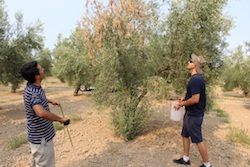An organic solution to heal plants and help them grow
When it comes to old habits dying hard, the agriculture industry is probably a case in point. Agrochemicals used to protect crops have been proving their worth for decades, so how can farmers stop using them when alternatives are so difficult to find? As demand for food keeps growing, the truth is that environmental concerns tend to give way under the weight of market pressure. The market, however, is changing. Consumers are increasingly willing to pay an extra for organic food, and this has translated into growth for the biopesticide market. Although still marginal, this blooming market is expected to reach USD 6.6 billion by 2020. And whilst the complete replacement of chemicals for crop protection won’t happen overnight, maybe it doesn’t have to. “We think that aiming to completely substitute agrochemical products might be difficult at first, so the only way to get there is to start by developing biological products compatible with agrochemicals,” says Borja Torres, one of the founders of Spanish company XTrem Biotech. Xtrem Biotech specializes in extremophile microorganisms, which are able to survive and compete in extreme environments. The company is also the producer of a biological solution called XTONE that shows high compatibility with existing chemical plant treatment and remains effective for a long time when combined with such conventional solutions. At the heart of XTONE is XT1 – a patented extremophile bacterium that can help plants defend themselves against external pathogens and stresses. “XT1 is a bacterial strain isolated from an extreme environment with high concentration of salt and it is a ‘natural survivor’,” Torres explains. “We have selected it out of hundreds of soil microbes and patented it because it shows very good properties as a plant biostimulant and biopesticide. Now, we have extended the patent to the main agricultural markets.” So what exactly makes XT1 making it an ideal candidate to help plants fight disease, you might ask. There are actually many reasons for that: It is a plant growth stimulant; it helps prevent plant pathogens such as bacteria, insects, fungi and nematodes; it can survive under extreme conditions; it can be stored without any loss of efficacy; and it can survive in saline and draught conditions. Compared with chemical alternatives, XT1 has similar efficacy whilst showing much lower toxicity. It also proved effective against verticillium, a plant disease with no effective treatment so far that notably affect olive trees. Tests in Spain – the largest olive oil producer in the world – led to very positive feedback from growers, whilst farmers growing strawberry, tomato, cucumber, and other vegetables also showed interest in XTONE. “The product is specifically targeted to organic growers who cannot use the chemical alternatives,” Torres points out. Although it is still more expensive than chemicals, Torres expects the cost of XTONE to decrease as production volumes grow. “Achieving development agreements with multinational players will allow cost reductions through scaling-up processes,” he says. Funding under SME Instrument phase 1 was a means to that end: “This has been an important milestone for the company. Apart from the visibility and recognition from the industry and consumers, it has allowed us to speed-up the development of our products and to define our development plan thanks to consultancy from industry experts. We are now convinced that Xtrem Biotech has an exciting future ahead with great perspectives and new agro-solutions to be developed. We are starting conversations with investment firms to address them preferably in cooperation with industrial partners,” Torres concludes.







